June 17, 2025 | 03:30 GMT +7
June 17, 2025 | 03:30 GMT +7
Hotline: 0913.378.918
June 17, 2025 | 03:30 GMT +7
Hotline: 0913.378.918
Having graduated from the University of Transport and Communication; However, the young man Hoang Minh Thanh has a strong love for agriculture. That love blossomed from a young age and grew over the years as he learned from his mother (an agricultural engineer) the knowledge and inspiration for agriculture. With that passion, Thanh made a surprising decision to leave the city and return to his hometown to work in agriculture.
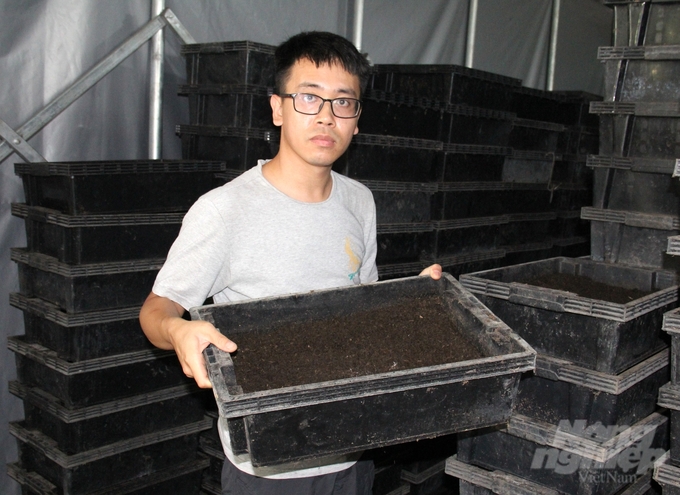
According to Mr. Hoang Minh Thanh, Director of Riti Cooperative, if you are not persistent, it will be difficult to produce organic agriculture. Photo: Trung Quan.
Realizing that herbal tea is increasingly popular with consumers, Thanh plans to create his own brand. In 2020, after a period of preparation and testing, Riti Cooperative with Thanh as Director specializing in producing organic chrysanthemum flowers was established.
To create quality products and ensure compliance with the requirements of organic certification organizations, the cooperative moved the growing area in Ninh Tien commune (Ninh Binh city) to Bai village, Son Lai commune (Nho Quan district, Ninh Binh) to avoid negative impacts from the surrounding non-organic area.
Setting foot on the new land, the cooperative tightened management of all stages, built standard fences, and dug a canal system to isolate it from the surrounding area. The cultivated area has also been expanded to nearly 2.5 hectares.
Mr. Thanh shared that after switching to farming, he immediately started organic production - a fairly new model that requires very high knowledge, standards, and patience, so the challenge is not small. In addition, this form of production costs a lot of money, pushing up product prices, making it difficult to compete in the market, while the cooperative's brand is still quite unfamiliar to many people.
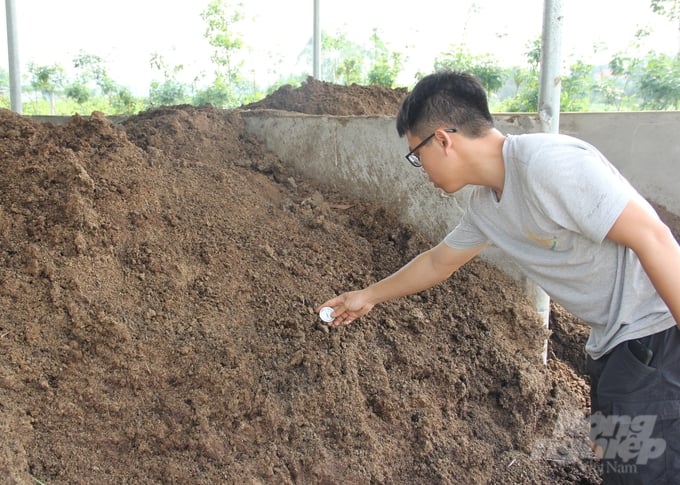
To ensure quality, Riti Cooperative built a separate fertilizer production area to compost cow manure using the aerobic method (compost). Photo: Trung Quan.
Without hesitation, cooperative members persistently introduced the farming process and were ready to welcome customers to visit the production area if needed. Thanks to that, the cooperative's raw and processed chrysanthemum products are increasingly interested by consumers and many orders were being made.
Providing quality products to the domestic market does not make a young, energetic, and ambition person like Thanh feel satisfied. Organic chrysanthemum tea products under the Riti brand must be on store shelves in foreign markets.
That thought quickly turned into action when the cooperative devoted all its resources and energy to maintain the granted organic standard certification and strive to achieve international organic certifications. This is not easy when the requirements are extremely strict. Organic certification must be re-evaluated after 2 years, otherwise it will be revoked. Therefore, every stage of production is managed very strictly.
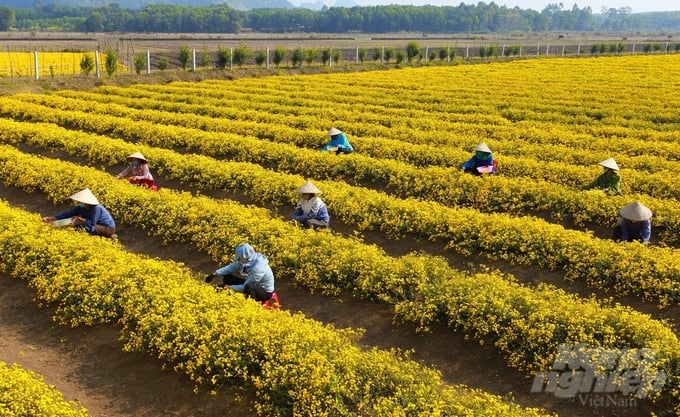
Strictly managing all stages according to organic standards helps Riti Cooperative raise the level of herbal tea in Ninh Binh. Photo: Cooperative.
Regarding seedlings, if the cooperative cannot keep varieties produced in an organically certified area, it can only use varieties purchased from units with equivalent organic certification. In case there are none, seeds must be purchased from non-organic areas. They cannot be used directly but must be transferred to the buffer growing area of the cooperative, and after 1 year, they will be transferred to the organic growing area.
Regarding fertilizers, used of chemical inputs is absolutely not allowed. Even microbial organic fertilizers licensed according to standards that do not comply with organic farming standards 11041-2:2017 cannot be used in the cooperative's farming area.
To overcome this, the cooperative built a separate fertilizer production area to compost cow manure using the aerobic method (compost). After 40 - 45 days, the manure decomposes and changes color to coffee brown. Part of it will be used to improve the soil, another part of it will be used to raise earthworms. Mixing composted manure and vermicompost for plants helps the cooperative make the most of the microorganism that loves high temperatures (30 - 80 degrees Celsius in compost) and low temperatures (worm compost 10 - 30 degrees Celsius) to manage pathogens in the soil, minimize pests and pesticide use. Areas lacking phosphorus or low pH can use Ninh Binh fused phosphate fertilizer to replace simple fertilizers to overcome this problem (Ninh Binh fused phosphate fertilizer is allowed to be used for organic growing areas).
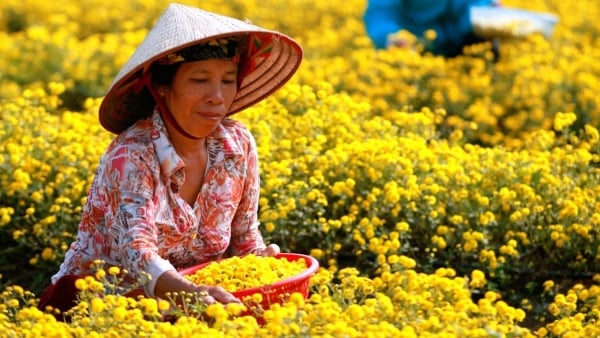
Harvesting chrysanthemum flowers at Riti Cooperative. Photo: Trung Quan.
Regarding harmful pest management, the cooperative follows the principle of "occupancy", using beneficial fungi and bacteria to inhibit harmful ones. For mealybugs and aphids, they will rely on natural sources of ladybugs for control. For thrips hiding in flowers, farmers use the freeze-drying method and blow fans to remove them. Bacterial root rot is controlled by antagonistic fungi. The cooperative multiplies the microflora in vermicompost to maximum quantities (fed with molasses, aerated with oxygen) and then pushes it through the drip irrigation pipe into the field, seeping into the soil to inhibit bacteria.
Regarding water sources, the cooperative digs a water supply and storage pond system inside the canal to avoid risks caused by pesticide residues from surrounding households being discharged into the water source.
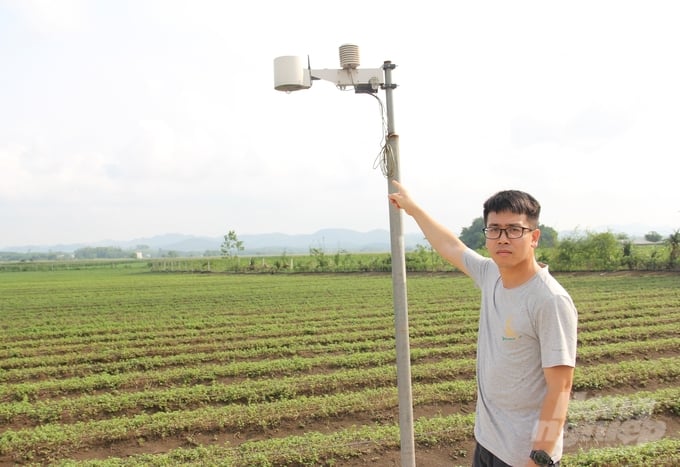
According to Mr. Thanh, achieving organic certification is difficult, but maintaining certification is even more difficult. Photo: Trung Quan.
According to Mr. Thanh, achieving organic certification is difficult, but keeping and maintaining the certification is even more difficult. Therefore, without determination and perseverance, it will be difficult to do. Currently, even though it has been certified organic in Vietnam, the cooperative still continuously takes samples for analysis according to USDA, JAS standards... with more than 1,000 active ingredients to progress towards achieving these certifications to qualify for bringing products into tough markets.
“Achieving organic certification does not mean chasing achievements or polishing your reputation because these certifications are very difficult to achieve and cost a lot of money. However, the cooperative still does it because of the desire to restore the medicinal tea line at a higher quality. At the same time, it affirms that Ninh Binh in particular and Vietnam in general can absolutely create world-class quality products," Mr. Thanh confided.
Translated by Bao Ngoc
![Turning wind and rain into action: [4] Bringing climate bulletins to remote and isolated areas](https://t.ex-cdn.com/nongnghiepmoitruong.vn/608w/files/linhnhp/2025/06/14/1152-z6704423696987_15fd32ffc26d590d204d520c9dac6786-nongnghiep-151141.jpg)
(VAN) The Vietnam Agriculture and Nature Newspaper interviewed Mr. Vu Thai Truong, Acting Head of Climate Change and Environment at UNDP Vietnam, to gain deeper insight into how climate bulletins are delivered to farmers.

(VAN) In Tien Giang, a high-tech shrimp farm has developed a distinctive energy-saving farming model that has yielded promising results.
![Turning wind and rain into action: [3] 300.000 farmers benefit from agro-climatic bulletins](https://t.ex-cdn.com/nongnghiepmoitruong.vn/608w/files/news/2025/06/12/e5a48259d6a262fc3bb3-nongnghiep-125122.jpg)
(VAN) The agro-climatic bulletin has become a valuable tool for farmers in the Mekong Delta. After more than five years of implementation, the initiative is gradually being expanded nationwide.
![Turning wind and rain into action: [2] Providing forecasts to the people](https://t.ex-cdn.com/nongnghiepmoitruong.vn/608w/files/news/2025/06/12/e5a48259d6a262fc3bb3-nongnghiep-103927.jpg)
(VAN) In addition to improving the quality of hydrometeorological forecasts, putting forecast bulletins into practical use is crucial for production and disaster prevention.

(VAN) Blue carbon is receiving attention for its rapid absorption capacity and vast potential. It represents a promising nature-based solution to respond to climate change.
/2025/06/11/3507-1-161904_583.jpg)
(VAN) Seagrass beds and coral reefs serve as 'cradles' that nurture life in the ocean depths, creating rich aquatic resources in Vietnamese waters.
![Turning wind and rain into action: [1] Forecasting for farmers](https://t.ex-cdn.com/nongnghiepmoitruong.vn/608w/files/news/2025/06/11/e5a48259d6a262fc3bb3-nongnghiep-111919.jpg)
(VAN) Weather is no longer just a matter of fate. Forecasts have now become an essential companion for farmers in every crop season.